
-
 Inothewayurthinkin denies Mullins, Galopin Des Champs Gold Cup hat-trick
Inothewayurthinkin denies Mullins, Galopin Des Champs Gold Cup hat-trick
-
Inothewayurthinkin beats Galopin Des Champs to win Cheltenham Gold Cup

-
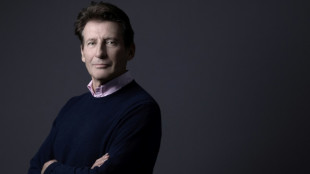 Sebastian Coe criticises IOC election process
Sebastian Coe criticises IOC election process
-
Israel PM, security agency fight it out in public
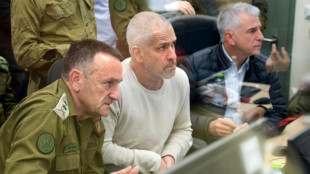
-
 Courtois returns from Belgium exile for Nations League duty
Courtois returns from Belgium exile for Nations League duty
-
Dupont absence 'changes nothing' for Alldritt before France's Six Nations decider

-
 Russia 'committed crimes against humanity' in Ukraine: UN probe
Russia 'committed crimes against humanity' in Ukraine: UN probe
-
Trump hails 'productive' truce talks with Russia, urges Putin to spare Ukrainians
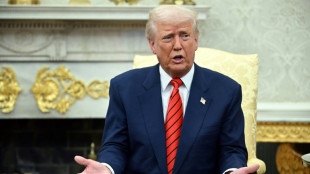
-
 Hundreds of Olympians call on IOC candidates to make climate top priority
Hundreds of Olympians call on IOC candidates to make climate top priority
-
Florence cathedral closed as Italy's Tuscany on flood alert

-
 Mark Carney: Canada's new PM charted unusual path to power
Mark Carney: Canada's new PM charted unusual path to power
-
Arteta 'proud' of Lewis-Skelly's England call-up

-
 Mark Carney sworn in as Canada PM
Mark Carney sworn in as Canada PM
-
US govt shutdown in balance after top Democrat avoids fight
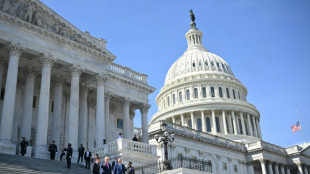
-
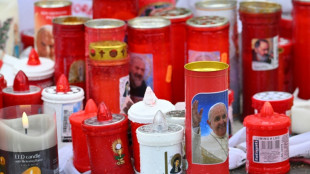 Pope marks month in hospital as footballers send messages
Pope marks month in hospital as footballers send messages
-
Crew launch to ISS paves way for stranded astronauts' homecoming
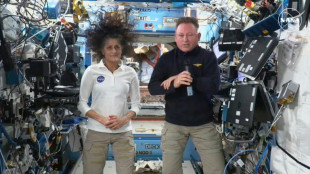
-
 Hamas says ready to free Israeli-US hostage, four bodies
Hamas says ready to free Israeli-US hostage, four bodies
-
Wainwright says Wales want to send Sherratt out on Six Nations high

-
 Just looking at images of nature can relieve pain, study finds
Just looking at images of nature can relieve pain, study finds
-
Guardiola relishing 'big fight' for Champions League qualification

-
 Duterte follows ICC hearing over drug war case via videolink
Duterte follows ICC hearing over drug war case via videolink
-
Mark Carney to be sworn in as Canada PM

-
 Chelsea can be flexible, says Maresca
Chelsea can be flexible, says Maresca
-
UN migration agency laying off around 20% of HQ staff amid US aid cuts: sources

-
 Pique denies Rubiales kickbacks in Spanish Super Cup move to Saudi
Pique denies Rubiales kickbacks in Spanish Super Cup move to Saudi
-
Tuchel hopes to bring Premier League power to England reign

-
 UN chief promises to do "everything" to avoid food cuts to Rohingyas in Bangladesh
UN chief promises to do "everything" to avoid food cuts to Rohingyas in Bangladesh
-
UniCredit gets ECB nod on Commerzbank stake, but delays merger decision

-
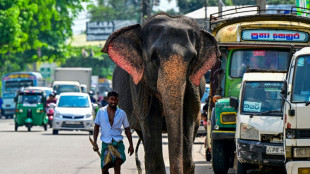 Sri Lanka adjusts train timings to tackle elephant deaths
Sri Lanka adjusts train timings to tackle elephant deaths
-
Scotland out to 'disrupt' France's Six Nations title hopes, says Russell

-
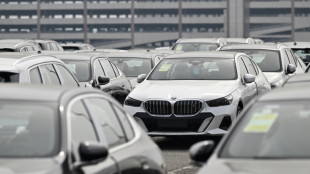 BMW expects big hit from tariffs after 2024 profits plunge
BMW expects big hit from tariffs after 2024 profits plunge
-
Bayern's Kim sidelined for 'several weeks' with injury

-
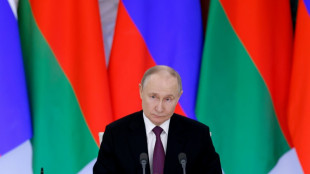 Kremlin says Putin sent 'additional' signals to Trump on ceasefire
Kremlin says Putin sent 'additional' signals to Trump on ceasefire
-
Funding cuts force WFP to stop food aid to one million in Myanmar

-
 Thai football body to sue former chief over finances
Thai football body to sue former chief over finances
-
Spain call up Asencio for Nations League quarters

-
 Duterte set to face ICC judges in drug war case
Duterte set to face ICC judges in drug war case
-
Gold tops $3,000 for first time on Trump tariff threats

-
 Canada's Carney to be sworn in as new PM
Canada's Carney to be sworn in as new PM
-
Brignone on verge of World Cup glory with La Thuile super-G triumph

-
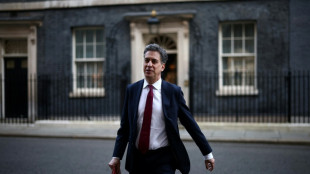 UK energy minister heads to China to talk climate
UK energy minister heads to China to talk climate
-
Fernandes hits back at Ratcliffe over 'overpaid' jibe

-
 Liverpool's Alexander-Arnold to miss League Cup final in injury blow
Liverpool's Alexander-Arnold to miss League Cup final in injury blow
-
'God never sleeps': Philippines opponents of Duterte's drug war

-
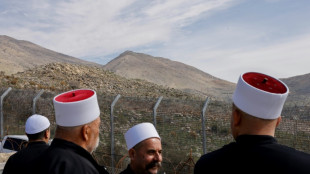 Syrian Druze cross armistice line for pilgrimage to Israel
Syrian Druze cross armistice line for pilgrimage to Israel
-
Thousands pay to catch glimpse of Ohtani practise in Tokyo

-
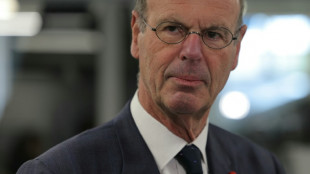 French finance minister calls trade war 'idiotic', plans US trip
French finance minister calls trade war 'idiotic', plans US trip
-
UN chief in Rohingya refugee camp solidarity visit

-
 Rashford, Henderson recalled in Tuchel's first England squad
Rashford, Henderson recalled in Tuchel's first England squad
-
WFP says funding shortfall forces it to cut food aid to 1 mn people in Myanmar


Animal testing put to the test in Swiss vote
Switzerland goes to the polls Sunday to decide whether animal and human testing should be banned -- a proposal that has triggered an outcry in a country heavily reliant on big pharma.
Opinions suggest that the proposal by animal rights defenders is highly unlikely to pass.
But if it did, "Switzerland would be the only country internationally with such a ban," said Yves Fluckiger, president of the Swiss universities lobby group.
Researchers insist that medical progress is impossible without experimentation.
At the University of Geneva, Patrycja Nowak-Sliwinska, head of the molecular pharmacology laboratory, unveils her cell incubator where intestinal organoids from cancer patients are being cultivated.
These structures, made up of cells, make it possible to test a large number of potential treatments.
"With the in vitro model, we try to find promising candidates" -- and only the latter would then be tested on animals, said Nowak-Sliwinska, who received a prize rewarding researchers who work to replace animals with other methods.
But even she said it would be impossible to do all the research without animal experimentation and clinical trials.
This is why the university's Faculty of Medicine has an animal facility in the basement housing some 25,000 animals -- mostly mice and rats.
- Strict protocols -
Inside, Professor Doron Merkler conducts research to find a treatment for a form of multiple sclerosis.
The research could not advance without using mice, into which he injects modified cells to observe how the disease affects the nervous system.
The mouse he is working on is showing symptoms: instability, difficulty moving, and partial paralysis of the limbs.
The experiments are framed by a strict protocol regarding their degree of severity, and animal keepers are trained to detect when an animal is not well.
"If no veterinary care can be provided to the animal, we can decide with the researcher to sacrifice it," said Pierre Bonnaventure, head of animal facilities at the faculty.
In Switzerland, researchers seeking to use live animals must make a formal request, establish that there is no alternative method available and that the conditions imposed on the animals will be as light as possible.
The number of animals used has consequently fallen sharply, from nearly two million per year in the early 1980s to around 560,000.
Some 20,000 animals a year undergo severe interventions, such as the implantation of a tumour, according to federal authorities.
- Proposal 'goes too far' -
Under Switzerland's direct democracy system, campaigners collected enough signatures to trigger a popular vote.
The proposal would outlaw experiments not only on animals but on humans too, as well as ban the importation of new drugs developed through such means.
"Animal experiments should be considered a crime," Renato Werndli, a doctor among those who launched the initiative, told AFP.
All the major political parties in Switzerland are against the proposal.
For the government, the ban "goes too far" and would have "serious consequences for health" -- and also for the economy, in a country where the chemical and pharmaceutical sector represents just over half of all exports.
Interpharma, the Swiss pharmaceutical industry's lobby group, warned that in the event of a ban, "the institutions and companies concerned would be forced to relocate their activities abroad".
Switzerland has already rejected three initiatives on the subject -- in 1985 (70 percent), 1992 (56 percent) and 1993 (72 percent) -- and is expected to do likewise this time.
But it remains to be seen whether the majority will be as big, in a society where animal welfare has grown in importance.
For Samia Hurst, a bioethicist at the University of Geneva, the new initiative commits "a fairly frequent mistake, which is to target biomedical research".
However, she told AFP: "Animal experimentation, among the various uses that humanity makes of other species, is both the most closely monitored and undoubtedly the most justified."
F.Müller--BTB


